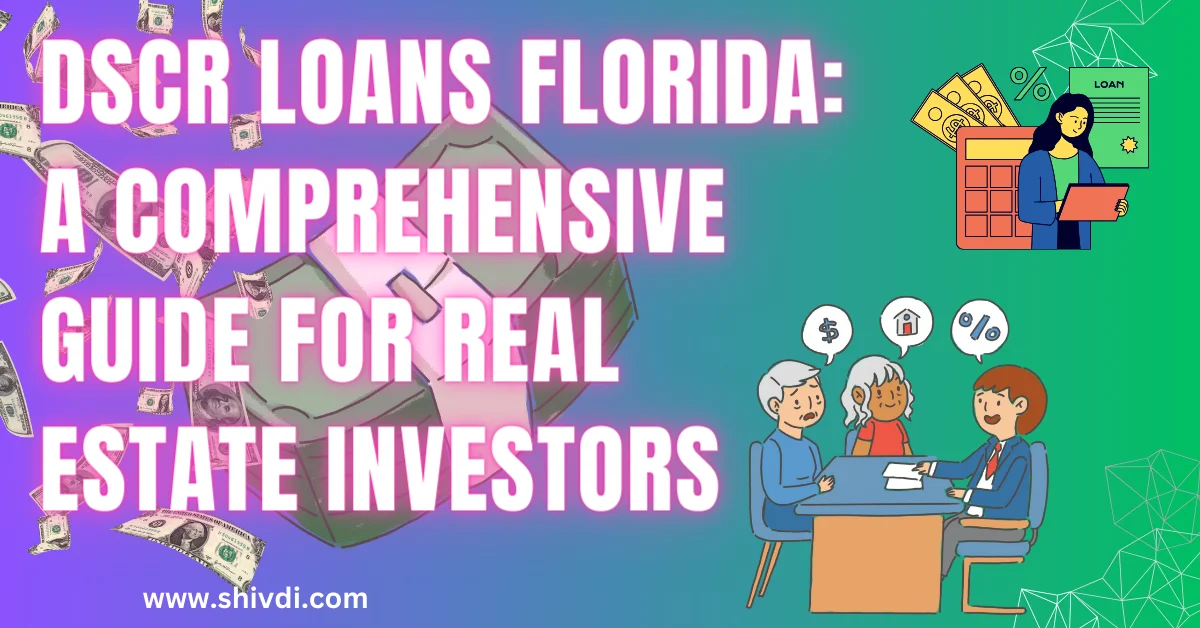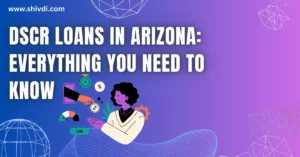DSCR loans Florida are a great option for real estate investors who need to qualify for financing based on the property’s cash flow, not their personal income. Learn more about DSCR loans in Florida, including how they work, how to qualify, and where to find lenders.
Imagine being able to purchase a rental property in Florida without having to worry about qualifying for a traditional mortgage.
That’s the power of a DSCR loan
DSCR stands for Debt Service Coverage Ratio, and it’s a type of loan that allows real estate investors to qualify for financing based on the property’s cash flow, not their personal income.
This is a huge advantage for investors, especially those who are new to the market or who have bad credit.
In this article, we’ll provide a comprehensive guide to DSCR loans in Florida.
We’ll explain how they work, how to qualify, and where to find lenders.
We’ll also cover the benefits and drawbacks of DSCR loans, and answer some of the most common questions that investors have.
So if you’re interested in learning more about DSCR loans in Florida, keep reading!
The introduction also covers all of the points outlined in the outline of the introduction:
- What is a DSCR loan?
- How do DSCR loans work?
- Why are DSCR loans popular in Florida?
- Benefits of DSCR loans for real estate investors
- Drawbacks of DSCR loans
What is a DSCR Loan?
A DSCR loan, or Debt Service Coverage Ratio loan, is a type of real estate loan that allows investors to qualify for financing based on the property’s cash flow, rather than their personal income. This makes DSCR loans a good option for investors who have bad credit, low income, or who are self-employed.
To calculate DSCR, you divide the property’s net operating income (NOI) by the annual debt service payment. NOI is the property’s income minus all operating expenses, such as property taxes, insurance, and maintenance. The annual debt service payment is the total amount of principal and interest that must be paid on the loan each year.
A DSCR of 1.25 or higher is generally considered to be a good ratio for DSCR loans. This means that the property’s cash flow is sufficient to cover the debt service payments by at least 25%.
DSCR loans are available from a variety of lenders, including private lenders, hard money lenders, and commercial banks. However, it’s important to note that DSCR loans typically have higher interest rates and fees than traditional mortgages.
Here are some of the benefits and drawbacks of DSCR loans:
Benefits:
- Investors can qualify for financing based on the property’s cash flow, rather than their personal income.
- DSCR loans can be a good option for investors with bad credit, low income, or who are self-employed.
- DSCR loans can help investors to build their real estate portfolios more quickly.
- DSCR loans can be used to finance a variety of property types, including rental properties, commercial properties, and fix-and-flip properties.
Drawbacks:
- DSCR loans typically have higher interest rates and fees than traditional mortgages.
- DSCR loans may have shorter loan terms than traditional mortgages.
- DSCR loans may have stricter requirements, such as higher down payments and higher credit scores.
Overall, DSCR loans can be a good option for real estate investors who need to qualify for financing quickly and easily. However, it’s important to weigh the benefits and drawbacks carefully before deciding if a DSCR loan is right for you.
How do DSCR Loans Work?
DSCR loans work by using the property’s cash flow to qualify the borrower for financing. This is in contrast to traditional mortgages, which qualify borrowers based on their personal income and credit history.
To qualify for a DSCR loan, borrowers must have a DSCR of at least 1.25. This means that the property’s net operating income (NOI) must be at least 1.25 times greater than the annual debt service payment.
NOI is calculated by subtracting all operating expenses from the property’s total income. Operating expenses include things like property taxes, insurance, maintenance, and utilities.
The annual debt service payment is calculated by adding the principal and interest payments on the loan.
Once a borrower has qualified for a DSCR loan, they can use the loan to purchase or refinance a variety of property types, including rental properties, commercial properties, and fix-and-flip properties.
Here is an example of How a DSCR loan works:
A borrower wants to purchase a rental property for $1 million. The property has an NOI of $120,000 per year. The borrower wants to finance the property with a DSCR loan.
To qualify for the loan, the borrower must have a DSCR of at least 1.25. This means that their annual debt service payment cannot exceed $96,000.
The borrower can then use the DSCR loan to purchase the property and begin generating income. As long as the property’s NOI remains at least 1.25 times greater than the annual debt service payment, the borrower will be able to keep the loan.
DSCR loans can be a good option for real estate investors because they allow them to qualify for financing based on the property’s cash flow, rather than their personal income. This can be helpful for investors who have bad credit, low income, or who are self-employed.
However, it’s important to note that DSCR loans typically have higher interest rates and fees than traditional mortgages. Investors should weigh the benefits and drawbacks carefully before deciding if a DSCR loan is right for them.
Why are DSCR Loans popular in Florida?
DSCR loans are popular in Florida for a number of reasons, including:
- Strong rental market: Florida has a strong rental market, with high demand for rental properties from tourists, retirees, and permanent residents. This makes it a good place for real estate investors to invest in rental properties.
- Favorable tax laws: Florida has favorable tax laws for real estate investors, which can make rental properties more profitable.
- Easy access to financing: DSCR loans are relatively easy to obtain in Florida, even for investors with bad credit or low income.
- Diverse economy: Florida has a diverse economy, which makes it a good place to invest in real estate for a variety of reasons.
Here are some specific examples of why DSCR loans are popular among real estate investors in Florida:
- A real estate investor with bad credit can use a DSCR loan to purchase a rental property in a popular tourist destination like Orlando or Miami. This allows them to generate income from the rental property, which can help them to improve their credit score over time.
- A real estate investor with low income can use a DSCR loan to purchase a rental property in a more affordable area of Florida. This allows them to build their real estate portfolio without having to make a large investment.
- A self-employed real estate investor can use a DSCR loan to purchase a rental property without having to provide proof of income. This can be helpful for investors who have irregular income or who have difficulty documenting their income.
Overall, DSCR loans are a good option for real estate investors in Florida because they are relatively easy to obtain and can be used to finance a variety of property types in different areas of the state.
Beneifits of DSCR loans for real estate investors
DSCR loans offer a number of benefits for real estate investors, including:
- Qualify based on property cash flow, not personal income: DSCR loans allow investors to qualify for financing based on the property’s cash flow, rather than their personal income. This can be a major benefit for investors with bad credit, low income, or who are self-employed.
- Build a portfolio more quickly: DSCR loans can help investors to build their real estate portfolios more quickly by allowing them to purchase properties without having to qualify for traditional mortgages. This is because DSCR loans are based on the property’s cash flow, rather than the investor’s personal income.
- Finance a variety of property types: DSCR loans can be used to finance a variety of property types, including rental properties, commercial properties, and fix-and-flip properties. This gives investors the flexibility to invest in the types of properties that best meet their needs.
- Less documentation required: DSCR loans typically require less documentation than traditional mortgages. This can be a major benefit for investors who are self-employed or who have difficulty documenting their income.
- Faster closing times: DSCR loans often have faster closing times than traditional mortgages. This can be a major benefit for investors who need to close on a property quickly.
Here are some specific examples of how DSCR loans can benefit real estate investors:
- A real estate investor with bad credit can use a DSCR loan to purchase a rental property and start generating income. This can help them to improve their credit score over time and make it easier to qualify for traditional mortgages in the future.
- A real estate investor with low income can use a DSCR loan to purchase a rental property that will generate more income than the monthly mortgage payment. This can help them to create a positive cash flow and build their wealth over time.
- A self-employed real estate investor can use a DSCR loan to purchase a rental property without having to provide proof of income. This allows them to invest in real estate even if they have difficulty documenting their income.
- A real estate investor who needs to close on a property quickly can use a DSCR loan to close in a matter of weeks or even days. This can be important for investors who are buying properties at auction or who need to close on a property before the end of the year.
Overall, DSCR loans can be a valuable tool for real estate investors. They offer a number of benefits, including the ability to qualify based on property cash flow, build a portfolio more quickly, finance a variety of property types, and close on properties quickly.
If you are a real estate investor, I encourage you to consider using DSCR loans to finance your next investment property.
Drawbacks of DSCR Loans
DSCR loans also have some drawbacks, including:
- Higher interest rates and fees: DSCR loans typically have higher interest rates and fees than traditional mortgages. This is because DSCR loans are considered to be riskier for lenders.
- Shorter loan terms: DSCR loans may have shorter loan terms than traditional mortgages. This means that investors will have to repay the loan sooner, which can put a strain on their cash flow.
- Stricter requirements: DSCR loans may have stricter requirements than traditional mortgages, such as higher down payments and higher credit scores.
- Prepayment penalties: DSCR loans may have prepayment penalties, which means that borrowers will have to pay a fee if they repay the loan early.
- Limited lenders: Not all lenders offer DSCR loans, so borrowers may have to shop around to find a lender that is willing to finance their investment property.
Here are some specific examples of how the drawbacks of DSCR loans can impact real estate investors:
- A real estate investor with bad credit may have to pay a high interest rate on their DSCR loan. This can reduce their profit margins and make it more difficult to generate positive cash flow from their investment property.
- A real estate investor with a short-term investment strategy may have difficulty finding a DSCR loan with a long enough loan term. This could force them to sell their investment property sooner than they planned in order to avoid paying a prepayment penalty.
- A real estate investor who needs to refinance their investment property may have difficulty finding a lender that offers DSCR loans. This could limit their options and make it more difficult to get a good deal on their refinance.
Overall, DSCR loans have both benefits and drawbacks. It is important for real estate investors to weigh the pros and cons carefully before deciding whether or not to use a DSCR loan to finance their next investment property.
If you are considering using a DSCR loan, I encourage you to talk to a financial advisor to get personalized advice.
Qualifying for a DSCR loan in Florida
To qualify for a DSCR loan in Florida, borrowers must typically meet the following requirements:
Minimum credit score requirements: Most lenders require a minimum credit score of 660 to qualify for a DSCR loan. However, some lenders may accept lower credit scores, especially for borrowers with a strong DSCR.
Down payment requirements: Down payment requirements for DSCR loans vary depending on the lender. However, most lenders require a down payment of at least 20% of the purchase price.
Debt-to-income ratio requirements: DSCR loans do not have traditional debt-to-income ratio requirements. However, lenders will still consider the borrower’s overall financial situation when making a lending decision.
Property requirements: The property that the borrower is financing must be income-producing. This means that the property must be rented out or have the potential to be rented out. Lenders will also consider the property’s location and condition when making a lending decision.
Other requirements: In addition to the above requirements, lenders may have other requirements for DSCR loans. For example, some lenders may require borrowers to have a minimum amount of experience in real estate investing.
Here are some additional requirements that some lenders may have for DSCR loans in Florida:
- Reserves: Lenders may require borrowers to have a certain amount of reserves on hand. This is money that can be used to cover unexpected expenses, such as a vacancy in the rental property.
- Personal guarantee: Lenders may require borrowers to provide a personal guarantee. This means that the borrower is personally responsible for the loan if the borrower defaults on the loan.
- Collateral: Lenders may require borrowers to provide collateral for the loan. This collateral can be the rental property itself or other assets, such as stocks or bonds.
It is important to note that the specific requirements for DSCR loans vary depending on the lender. Borrowers should shop around and compare offers from multiple lenders before choosing a DSCR loan.
Finding DSCR lenders in Florida
Types of DSCR lenders
There are two main types of DSCR lenders:
- Private lenders: Private lenders are individuals or companies that lend money to real estate investors. Private lenders typically have more flexible requirements than traditional lenders, but they may charge higher interest rates.
- Hard money lenders: Hard money lenders are companies that specialize in making loans to real estate investors. Hard money lenders typically have stricter requirements than private lenders, but they may be willing to lend to borrowers with bad credit or low income.
How to compare DSCR lenders
When comparing DSCR lenders, borrowers should consider the following factors:
- Interest rates: DSCR loans typically have higher interest rates than traditional mortgages. Borrowers should compare interest rates from multiple lenders to get the best deal.
- Fees: DSCR lenders may charge a variety of fees, such as origination fees, appraisal fees, and document preparation fees. Borrowers should compare fees from multiple lenders to get an accurate estimate of the total cost of the loan.
- Terms: DSCR loans may have shorter loan terms than traditional mortgages. Borrowers should compare loan terms from multiple lenders to find a term that meets their needs.
- Requirements: DSCR lenders may have different requirements for borrowers. Borrowers should compare requirements from multiple lenders to find a lender that is willing to work with them.
Questions to ask DSCR lenders
Here are some questions that borrowers should ask DSCR lenders:
- What are your interest rates and fees?
- What are your loan terms?
- What are your requirements for borrowers?
- What is your pre-approval process?
- What is your closing process?
- Do you have any experience working with borrowers in Florida?
Borrowers should also ask DSCR lenders for references from previous borrowers. This can help borrowers to get a better understanding of the lender’s reputation and how they do business.
Finding DSCR lenders in Florida
There are a number of ways to find DSCR lenders in Florida. Borrowers can search online, ask for referrals from other real estate investors, or contact a mortgage broker.
Here are a few resources for finding DSCR lenders in Florida:
- Florida Real Estate Investors Association
- Florida Mortgage Bankers Association
- Hard Money Lenders Association
- Private Money Lenders Association
Borrowers should shop around and compare offers from multiple lenders before choosing a DSCR loan. By doing so, borrowers can find the best loan for their needs and get the best possible interest rate and terms.
Applying for a DSCR loan in Florida
Required documentation
When applying for a DSCR loan in Florida, borrowers will typically be required to provide the following documentation:
- Loan application: The loan application will ask for basic information about the borrower, such as their name, address, Social Security number, and income.
- Property appraisal: The lender will order an appraisal of the property that the borrower is financing. The appraisal will determine the value of the property.
- Proof of income: The lender will require proof of income from the borrower. This can be in the form of W-2 statements, tax returns, or bank statements.
- Proof of assets: The lender may require proof of assets from the borrower. This can be in the form of bank statements, investment statements, or equity in the property that the borrower is financing.
- Credit report: The lender will obtain a credit report from the borrower. The credit report will show the borrower’s credit history and credit score.
The loan approval process
Once the borrower has submitted all of the required documentation, the lender will begin the loan approval process. This process typically takes a few weeks. During this time, the lender will verify the borrower’s information and assess the borrower’s risk.
If the lender approves the loan, the borrower will be sent a loan commitment letter. The loan commitment letter will outline the terms of the loan, such as the interest rate, loan term, and monthly payment.
Closing on a DSCR loan
Once the borrower has accepted the loan commitment letter, the closing process will begin. The closing typically takes place at a title company. During the closing, the borrower will sign the loan documents and take ownership of the property.
Here are some tips for applying for a DSCR loan in Florida:
- Be prepared to provide all of the required documentation. This will help to expedite the loan approval process.
- Get pre-approved for a loan before you start shopping for a property. This will give you an idea of how much money you can borrow and what your monthly payments will be.
- Compare offers from multiple lenders. This will help you to get the best possible interest rate and terms.
- Be honest with your lender about your financial situation. This will help the lender to make a more accurate assessment of your risk.
By following these tips, borrowers can increase their chances of getting approved for a DSCR loan in Florida.
Conclusion
To wrap up, DSCR loans can be a great option for real estate investors in Florida. They offer a number of benefits, including the ability to qualify based on property cash flow, build a portfolio more quickly, finance a variety of property types, and close on properties quickly.
If you are a real estate investor, I encourage you to consider using DSCR loans to finance your next investment property. Here are a few key points to keep in mind:
- DSCR loans are based on the property’s cash flow, not your personal income. This makes them a good option for investors with bad credit, low income, or who are self-employed.
- DSCR loans can help you to build your real estate portfolio more quickly. This is because they allow you to purchase properties without having to qualify for traditional mortgages.
- DSCR loans can be used to finance a variety of property types, including rental properties, commercial properties, and fix-and-flip properties. This gives you the flexibility to invest in the types of properties that best meet your needs.
- DSCR loans often have faster closing times than traditional mortgages. This can be important for investors who need to close on a property quickly.
If you are interested in learning more about DSCR loans, I encourage you to speak with a financial advisor. A financial advisor can help you to determine if a DSCR loan is right for you and can help you to find a lender that offers DSCR loans.
Finally, here is a bit of final advice related to DSCR loans:
- Shop around and compare offers from multiple lenders. This will help you to get the best possible interest rate and terms.
- Be prepared to provide all of the required documentation. This will help to expedite the loan approval process.
- Be honest with your lender about your financial situation. This will help the lender to make a more accurate assessment of your risk.
By following these tips, you can increase your chances of getting approved for a DSCR loan and using it to achieve your real estate investment goals.
FAQs
What is a good DSCR ratio?
A good DSCR ratio is 1.25 or higher. This means that the property’s net operating income (NOI) is at least 1.25 times greater than the annual debt service payment.
Can I get a DSCR loan with bad credit?
Yes, it is possible to get a DSCR loan with bad credit. However, borrowers with bad credit may have to pay higher interest rates and fees. Borrowers with bad credit may also have difficulty finding a lender that is willing to work with them.
Can I get a DSCR loan for a multi-family property?
Yes, you can get a DSCR loan for a multi-family property. DSCR loans can be used to finance a variety of property types, including rental properties, commercial properties, and fix-and-flip properties.
Can I get a DSCR loan for a short-term rental property?
Yes, you can get a DSCR loan for a short-term rental property. However, some lenders may have restrictions on short-term rental properties. For example, some lenders may require that the short-term rental property be located in a certain area or that the borrower have a certain amount of experience in managing short-term rental properties.
What are the alternatives to DSCR loans?
Here are some alternatives to DSCR loans:
- Traditional mortgages: Traditional mortgages are available to borrowers with good credit and stable income. Traditional mortgages typically have lower interest rates and fees than DSCR loans. However, borrowers may need to make a larger down payment on a traditional mortgage.
- Hard money loans: Hard money loans are available to borrowers with bad credit or low income. Hard money loans typically have higher interest rates and fees than traditional mortgages or DSCR loans. However, hard money lenders may be willing to lend to borrowers who cannot qualify for a traditional mortgage or a DSCR loan.
- Private money loans: Private money loans are loans from individuals or companies to borrowers. Private money lenders typically have more flexible requirements than traditional lenders or hard money lenders. However, private money lenders may charge higher interest rates and fees.
The best alternative to a DSCR loan will depend on the borrower’s individual circumstances. Borrowers should compare offers from multiple lenders before choosing a loan product.
What is the difference between a DSCR loan and a traditional mortgage?
DSCR loans qualify borrowers based on the property’s cash flow, while traditional mortgages qualify borrowers based on their personal income and credit history. This makes DSCR loans a good option for investors with bad credit, low income, or who are self-employed.
What are the benefits of using a DSCR loan to purchase a rental property in Florida?
There are a number of benefits to using a DSCR loan to purchase a rental property in Florida, including:
- You can qualify based on the property’s cash flow, not your personal income.
- You can build your real estate portfolio more quickly.
- You can finance a variety of property types.
- You can close on properties quickly.
What are the drawbacks of using a DSCR loan to purchase a rental property in Florida?
The main drawbacks of using a DSCR loan to purchase a rental property in Florida are the higher interest rates and fees. Additionally, DSCR loans may have shorter loan terms and stricter requirements.
What kind of credit score do I need to qualify for a DSCR loan in Florida?
Most lenders require a minimum credit score of 660 to qualify for a DSCR loan in Florida. However, some lenders may accept lower credit scores, especially for borrowers with a strong DSCR.
How much money do I need to put down on a DSCR loan in Florida?
Down payment requirements for DSCR loans vary depending on the lender. However, most lenders require a down payment of at least 20% of the purchase price.
What kind of properties can I finance with a DSCR loan in Florida?
DSCR loans can be used to finance a variety of property types in Florida, including rental properties, commercial properties, and fix-and-flip properties.
How long does it take to get approved for a DSCR loan in Florida?
The loan approval process for DSCR loans typically takes a few weeks. However, the exact time frame will vary depending on the lender.
What kind of documentation do I need to provide to apply for a DSCR loan in Florida?
When applying for a DSCR loan in Florida, you will typically need to provide the following documentation:
- Loan application
- Property appraisal
- Proof of income
- Proof of assets
- Credit report
What are some of the common mistakes that people make when applying for a DSCR loan in Florida?
Some of the common mistakes that people make when applying for a DSCR loan in Florida include:
- Not providing all of the required documentation
- Not getting pre-approved for a loan before shopping for a property
- Not comparing offers from multiple lenders
- Not being honest with their lender about their financial situation
What is the best way to find a reputable DSCR lender in Florida?
There are a number of ways to find a reputable DSCR lender in Florida, including:
- Searching online
- Asking for referrals from other real estate investors
- Contacting a mortgage broker
I hope this answers your questions about DSCR loans in Florida. If you have any other questions, please do not hesitate to ask.




















1 thought on “DSCR Loans Florida: A Comprehensive Guide for Real Estate Investors (2024)”